The Mexico City: Memory and Tolerance Museum offers a profound and thought-provoking experience for visitors. This museum is dedicated to raising awareness about the Holocaust and other atrocities, housing over 1,200 powerful artifacts, documents, and audiovisual pieces. Visitors can explore captivating art installations that promote tolerance, peace, and human rights. From the haunting Lost Potential exhibit to the interactive YOU display, the museum provides an immersive journey that leaves a lasting impact. Whether you’re interested in history, art, or human rights, this museum promises to challenge your perspectives and leave you reflecting on the importance of remembrance and understanding.
Key Points
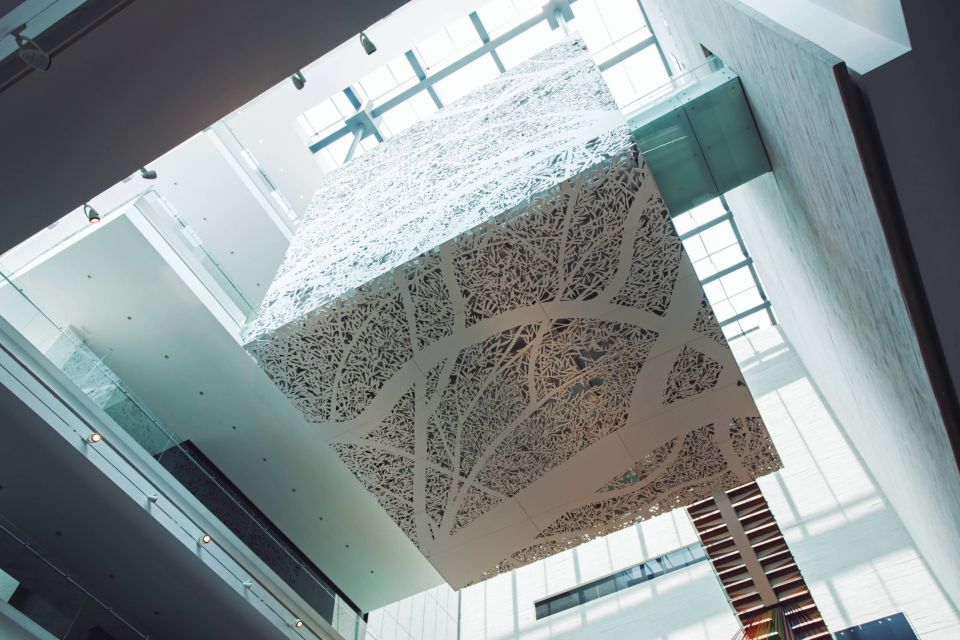
- Purchase tickets to visit the Memory and Tolerance Museum in Mexico City, which focuses on raising awareness about the Holocaust and other human rights atrocities.
- Explore thought-provoking installations, such as the Lost Potential metronome exhibit, that symbolize the devastating impact of genocide.
- Witness a fragment of the Berlin Wall and a World War II train wagon, serving as powerful reminders of the struggle for human rights and freedom.
- Engage with interactive displays and multimedia presentations to gain a deeper understanding of the Holocaust and other crimes against humanity.
- Experience the museum’s mission of promoting tolerance, peace, and human rights through its diverse exhibits and art installations.
Overview of the Museum
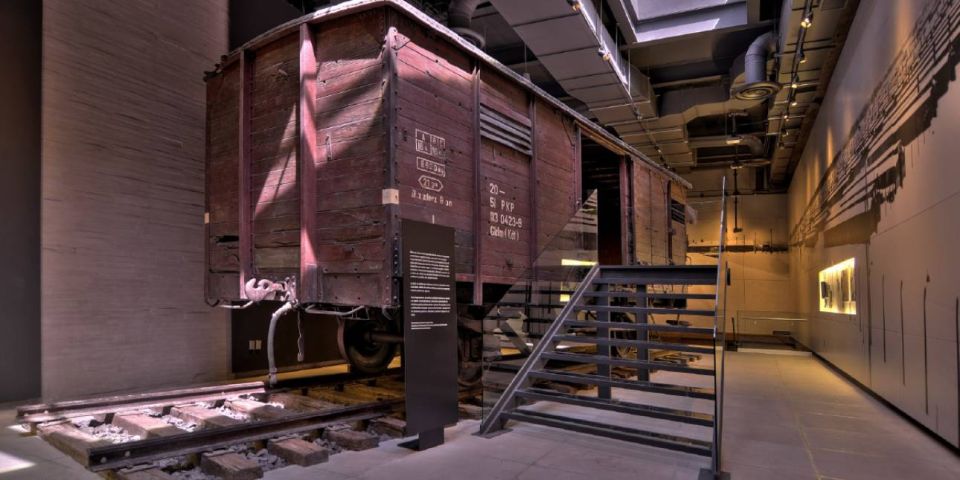
The Mexico City: Memory and Tolerance Museum is dedicated to raising awareness about the Holocaust and other crimes against humanity, while promoting tolerance, peace, and human rights.
With 43 permanent exhibition rooms, the museum houses over 1,200 objects, documents, and audiovisual pieces that tell powerful stories.
Visitors can explore thought-provoking art installations by renowned artists like Jan Hendrix, Lozano-Hemmer, Jorge Marin, and Rivelino.
The museum’s collection includes a train wagon used in World War II for prisoner transfer and a fragment of the Berlin Wall, offering a tangible connection to these historical events.
You can also read our reviews of more tours and experiences in Mexico City.
Highlights of the Exhibits
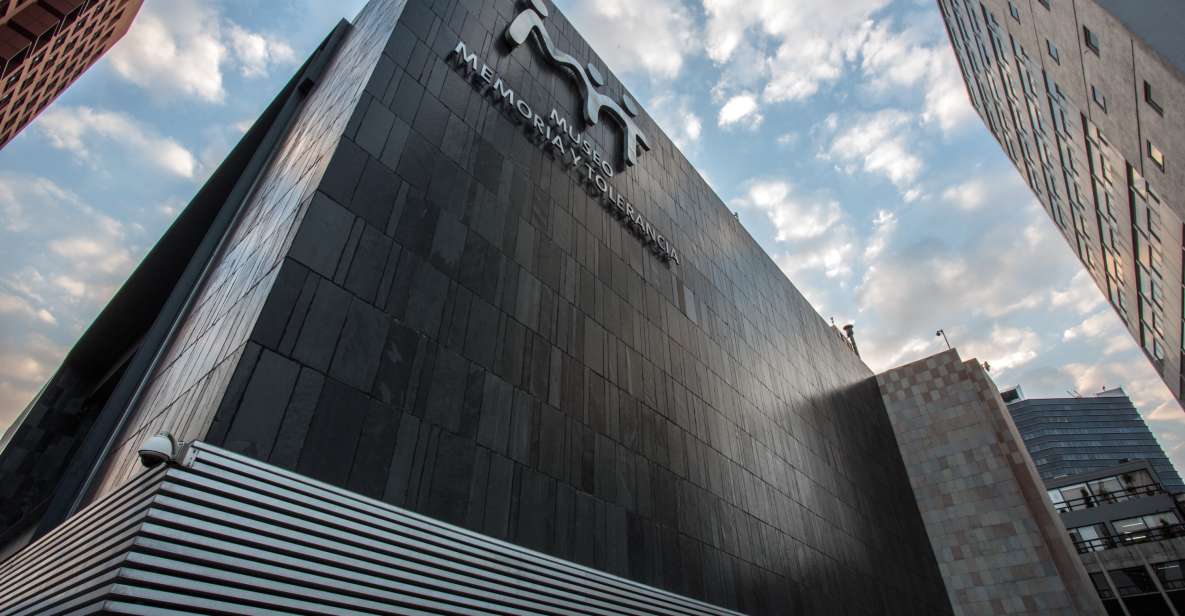
Visitors can explore a variety of thought-provoking art installations at the museum, including Lost Potential, metronomes, Wings of Peace, and YOU, as well as a powerful Cube exhibit.
The Lost Potential installation features metronomes representing the lives lost during the Holocaust and other genocides.
The Wings of Peace exhibit showcases a sculpture of angel wings, symbolizing the fight for human rights.
The YOU installation invites visitors to reflect on their own role in promoting tolerance.
The Cube exhibit presents a powerful visual representation of the scale and impact of genocide.
These exhibits, along with over 1,200 objects, documents, and audiovisual pieces, create a deeply immersive and impactful experience for visitors.
Permanent Exhibition Rooms
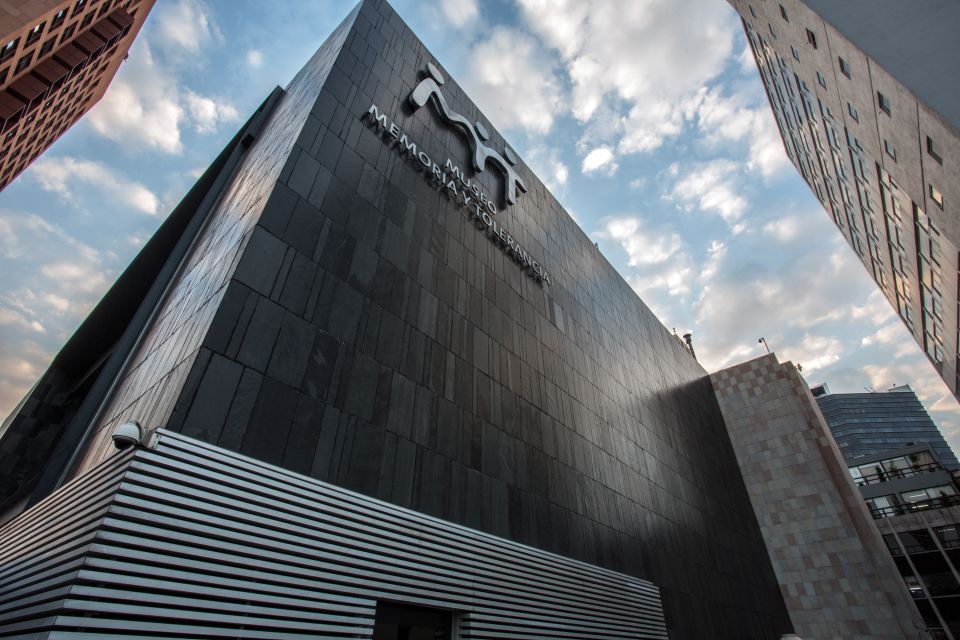
The Mexico City: Memory and Tolerance Museum boasts 43 permanent exhibition rooms, each one designed to educate and inspire visitors on the topics of the Holocaust, genocide, and the importance of promoting tolerance and human rights.
Visitors can expect to encounter a wealth of thought-provoking exhibits, including:
-
Lost Potential, a powerful art installation exploring the devastating impact of genocide.
-
A metronome exhibit symbolizing the relentless march of time and the fragility of human life.
-
Wings of Peace, a stunning sculpture that represents the resilience and hope of the human spirit.
-
YOU, an interactive display that invites visitors to reflect on their own role in creating a more just and compassionate world.
Artwork and Installations
Complementing the museum’s permanent exhibitions, the Mexico City: Memory and Tolerance Museum showcases a remarkable collection of thought-provoking artwork and installations created by renowned artists.
Visitors can explore pieces like ‘Lost Potential,’ a striking metronome installation that symbolizes the lost potential of Holocaust victims.
The ‘Wings of Peace‘ sculpture by Jorge Marin offers a powerful representation of hope and resilience, while ‘YOU‘ by Rivelino invites visitors to engage with the themes of identity and belonging.
Plus, the museum features a fragment of the Berlin Wall, serving as a poignant reminder of the divisive forces that once threatened human rights and freedom.
These powerful works of art contribute to the museum’s mission of promoting tolerance and understanding.
More Great Tours NearbyHolocaust and Genocide Exhibits
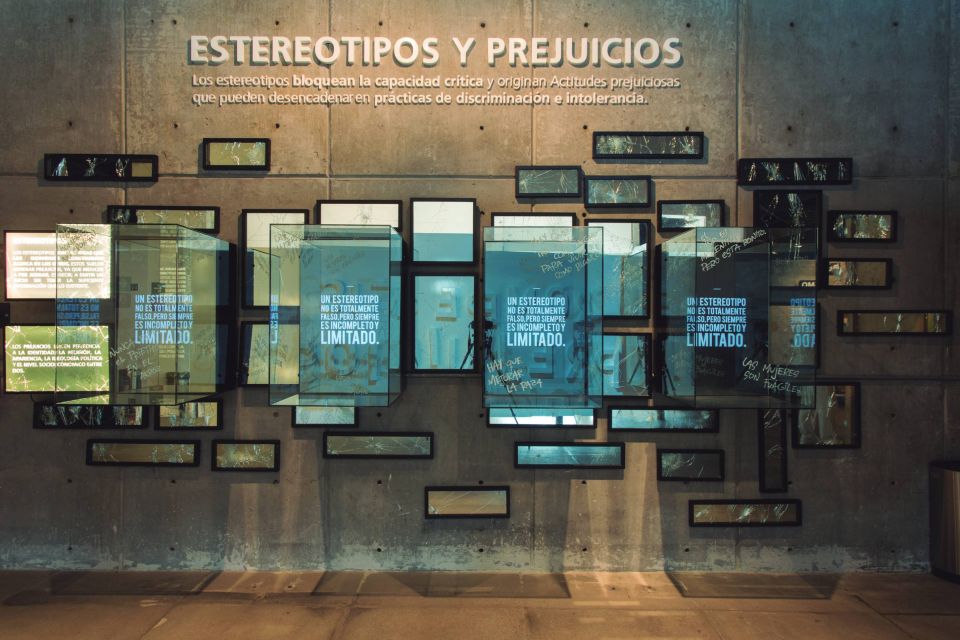
At the heart of the Mexico City: Memory and Tolerance Museum lies a profound exploration of the Holocaust and other atrocities, aiming to educate and foster understanding. Visitors can expect to encounter deeply moving exhibits that shed light on these tragic events.
The museum features:
- A train wagon used during World War II for prisoner transfer, a chilling reminder of the horrors of the past.
- A fragment of the Berlin Wall, symbolizing the resilience and triumph of the human spirit.
- Powerful art installations, such as ‘Lost Potential,’ which poignantly capture the devastating impact of genocide.
- Multimedia presentations and interactive displays that provide a visceral understanding of these devastating crimes against humanity.
Visitor Information
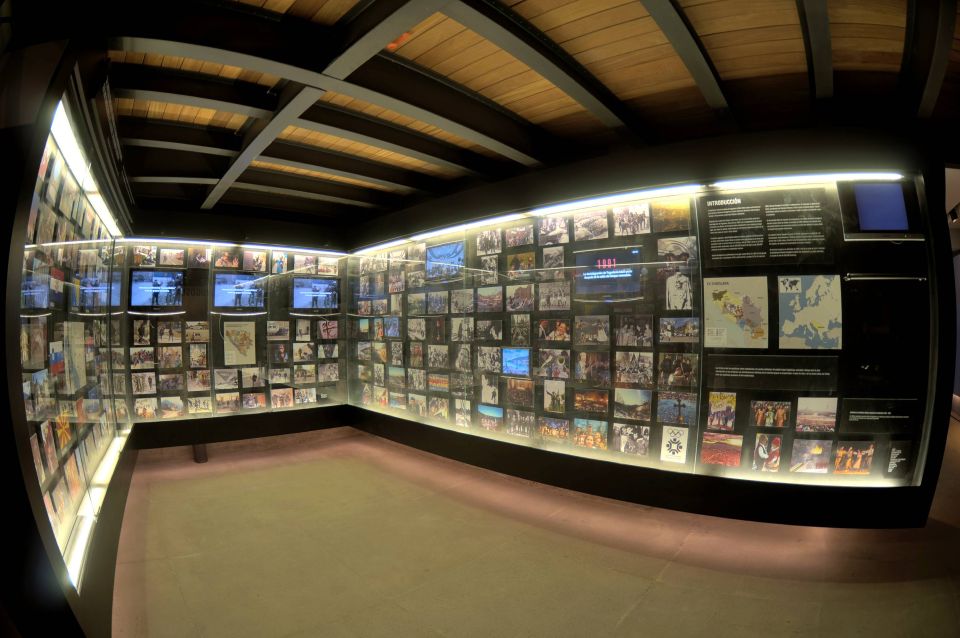
Visitors to the Mexico City: Memory and Tolerance Museum can expect a conveniently located attraction in downtown’s Plaza Juarez, offering a full-day experience.
The museum’s entry ticket includes access to its 43 permanent exhibition rooms, showcasing over 1,200 objects, documents, and audiovisual pieces.
Visitors can explore the museum’s thought-provoking exhibits on the Holocaust, genocide, and other crimes against humanity, as well as engage with powerful art installations.
The ticket also provides an audio guide in both Spanish and English, ensuring a comprehensive and immersive visit.
With wheelchair accessibility, the museum caters to visitors of all abilities.
Travelers are advised to reserve their tickets in advance, as the museum may not be suitable for children under 15 without adult accompaniment.
Museum Policies
The Mexico City: Memory and Tolerance Museum offers flexible cancellation policies, allowing visitors to receive a full refund if they cancel their tickets up to 24 hours in advance. Guests can also conveniently reserve their tickets now and pay later.
However, the museum may not be suitable for children under 15 without adult accompaniment.
The museum’s policies include:
- Free cancellation up to 24 hours prior to visit
- Reserve now, pay later option
- Recommended for visitors aged 15 and above without adult accompaniment
- Accessibility features for wheelchair users
These policies ensure a hassle-free and inclusive experience for all visitors, while also maintaining the museum’s focus on educating about the Holocaust, genocide, and promoting tolerance.
Getting to the Museum
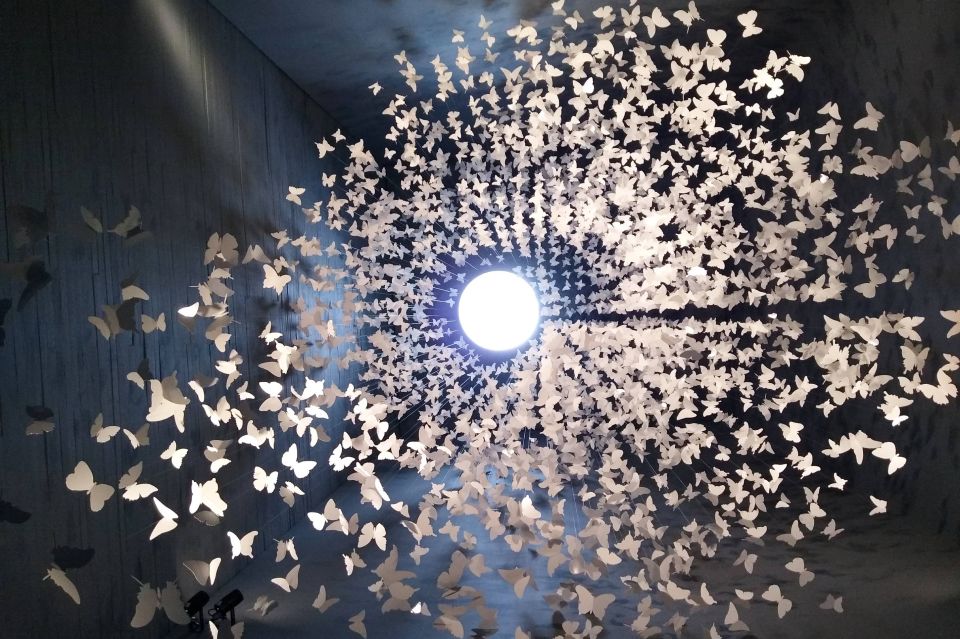
Conveniently located in downtown Mexico City, the Memory and Tolerance Museum can be easily accessed via public transportation.
Visitors can take the metro (subway) to the Juárez station, which is just a short walk away from the museum’s entrance on Plaza Juárez. Alternatively, visitors can take a taxi or rideshare service directly to the museum.
The museum is situated in a central and accessible area, making it convenient for both local and international visitors to reach. Ample parking is also available nearby for those who prefer to drive.
With its prime location, the Memory and Tolerance Museum is readily accessible to all who wish to explore its powerful exhibits and learn about its important mission.
Frequently Asked Questions
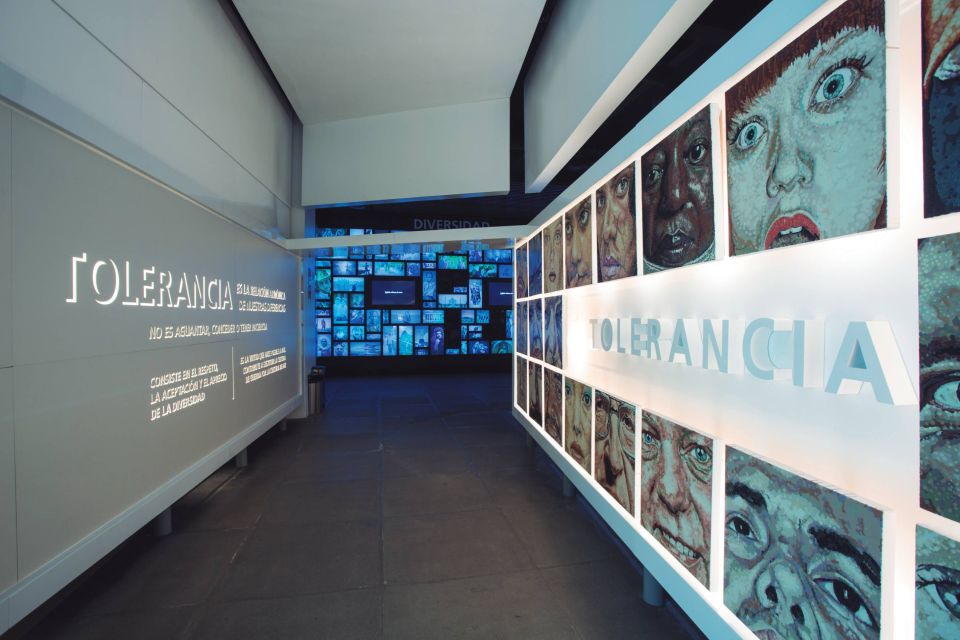
Do Tour Guides Provide Additional Insights Into the Exhibits?
Yes, tour guides typically provide additional insights and context about the museum’s exhibits, helping visitors better understand the significance and historical background of the displays. Their expertise enhances the overall educational experience.
Is Photography Allowed Inside the Museum?
Photography is generally allowed inside the museum, though visitors are advised to avoid using flash or tripods. Guests are welcome to take photos for personal use, but commercial photography may require prior permission from museum staff.
What Is the Dress Code for Visiting the Museum?
The museum doesn’t have a strict dress code, but visitors are encouraged to dress comfortably and respectfully. Casual, modest attire is appropriate, as the focus should be on the educational exhibits rather than appearance.
Are There Any Discounts or Special Offers for Students or Seniors?
The museum offers discounted entry tickets for students and seniors. Students can get a reduced rate by presenting a valid student ID, while seniors aged 65 and above are eligible for a senior discount. Visitors should inquire about these special offers when purchasing tickets.
Can I Bring My Own Food and Drinks Into the Museum?
Visitors can generally bring their own food and drinks into the museum, unless otherwise specified. Some museums may have restrictions on outside food and beverages to maintain cleanliness and avoid potential spills or disruptions.
Recap
The Mexico City: Memory and Tolerance Museum offers a powerful and moving experience for visitors, delving into the horrors of the Holocaust and other crimes against humanity.
Through thought-provoking art installations, interactive exhibits, and historical artifacts, the museum promotes tolerance, peace, and human rights, leaving a lasting impact on all who visit.
It’s a must-see destination for those seeking to understand and reflect on the darkest chapters of human history.
You can check availability for your dates here:More City Tours in Mexico City
More Tickets in Mexico City
- Ticket for the Frida Kahlo Museum
- Anahuacalli Museum and Diego Rivera Studio Tour With Admission Tickets
- Six Flags Mexico City General Admission Ticket
- Mexico City Templo Mayor PRIVATE TOUR: Ticket & Guide Included
- Frida Kahlo & Anahuacalli Museum Entrance Ticket
- Mexico City: Lucha Libre Wrestling Show Tickets
More Tour Reviews in Mexico City
Not for you? Here's more nearby things to do in Mexico City we have reviewed
- Massage Service – Transform your Space into a Luxury Spa
- Xochimilco, Coyoacan and Frida Kahlo Museum Tour
- PRIVATE Tour Chapultepec Castle
- Visit the Imperial Castle in Chapultepec
- Private Tour to the Pyramids of Teotihuacán From CDMX for 1 to 4 People
- Teotihuacán: Private Tour From Mexico City
- Skip-the-line Chapultepec Castle
- Colonial Treasures: San Miguel De Allende, Guanajuato, Zacatecas and Guadalajara
- Private Tour in the Soumaya Museum
- Balloon Flight at Sunrise Over Teotihuacan
- Tour Teotihuacan and Guadalupano Sanctuary
- EXCLUSIVE MARKETS TOUR IN MEXICO CITY – Small Groups
